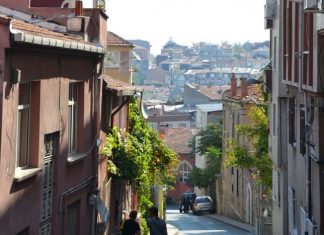Women’s organizations in Bulgaria were created as a result of internal changes in society, but foreign influences also played a role in changing traditional ideas about women’s roles and duties. Although there were some differences between groups, the main goal of Bulgarian women’s organizations during the National Revival period was to support girls’ education and raise awareness about women’s issues. They were also involved in charity and helping others. These organizations started women’s reading clubs and libraries, organized public lectures, and wrote articles for newspapers. Some members also took part in amateur theater performances The Transformation of the BWU’s Goals (1921).
International Connections of Women’s Organizations
During this time, Bulgarian women’s organizations made connections with international groups. After the April Uprising against Ottoman rule in 1876, many Bulgarian women’s organizations reached out to Russian diplomats in Constantinople, Bucharest, and Plovdiv, as well as schools in Russia, Romania, and Prague. They also contacted foreign missionaries, women’s organizations, and well-known individuals abroad to bring attention to the tragic events happening in Bulgaria. Some of the people they contacted included Lady Strangford, the Edinburgh Ladies’ Society, and the Russian Slavophil Committee in Moscow and its Ladies’ Branch balkan tours 2022.
Women’s Organizations After the Liberation (1878-1944)
The new Bulgarian state was established in 1878 as a constitutional monarchy led by a foreign dynasty. In this new political system, women’s education continued to be an important issue, especially secondary and higher education. The tradition of charitable and philanthropic work continued, but women’s activism started to focus more specifically on improving women’s rights. Over time, new goals were added, such as women gaining access to different professions, having equal rights, and voting.
Education as a Key Demand
Access to education was one of the earliest demands made by women. The new Bulgarian elite, much like other powerful groups around the world, followed the “two-sex model,” where men were seen as “properly political” and women as “naturally domestic.” They supported policies that kept boys’ and girls’ education separate. Once these separate educational systems were introduced, the differences in high-school curriculums were used as a reason to prevent girls from attending university. Many scholars, including the French sociologist Pierre Bourdieu, have argued that institutions like schools, the Church, and the State are responsible for maintaining old stereotypes and male dominance.








